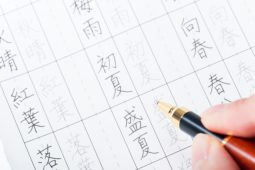Japanese has a reputation for being difficult to learn for adult students, and that reputation is well-earned. For most, the problem with Japanese is the written language, rather than the spoken one. The spoken grammar of Japanese is fairly regular, and pronunciation is overall a straightforward affair compared to, say, the complex grammar of Russian or the varied tonal pronunciation of Chinese.
Kanji, however, can be complex and daunting to learn.It’s certainly not impossible to master them though. In fact, compared to 16 years ago when I started, it’s never been easier for adults wanting to learn to read and write kanji. Here are some tips to get you going on the road to literacy in Japanese!
Goal Setting
I’ve said this in other educational articles, but it bears repeating. You must think about how to set appropriate goals for your learning. A good goal looks like this: “I will be able to read 250 kanji without a dictionary within 2 months. “A bad goal looks like “I’ll master 2000 kanji someday. “
In other words, set SMART goals: Specific, Measurable, Achievable, Relevant, and Timely. Make it concrete, with a numerical measure, that you can personally handle, that is something you need, and has a discreet time frame.
Once you’ve done that, you’re ready to get to the actual act of studying.
Study Tips
No matter what materials you use for your study, there are some general tips that are important to remember.
First, as you are reading and memorizing (using websites, SRS cards, whatever), don’t forget to write. Get a pencil and some kanji grid paper and practice. The physical act of going through the stroke orders and checking your handwriting is an excellent memory-booster. Don’t just read, write!
Second, try adding authentic materials to your study early on. Graded readers or children’s books introduce simple kanji in context, and those can really help build memories as you see kanji you just studied used in real sentences
Books
Even apart from general Japanese language textbooks, there are so many books out there that will help you learn kanji that it’s almost impossible to list them. There are varieties for every learning style, so be ready to browse and compare what you see with the way you learn best. Here are some recommendations to get you started:
Remembering the Kanji by James Heisig
A perennial favorite. Heisig uses a unique method of tying meaning to the shapes of kanji through mnemonic devices.It is purely based on meaning, though, so readings are taught separately. This can be an issue for some learners.
The Kanji Code by Natalie Hamilton
This is a newer book that, as opposed to Remembering the Kanji, focuses on readings.It analyzes component radicals and assigns on-yomi readings to kanji through that. This is a systematic way to attach sound to picture, which can be hard otherwise. This is a great supplement to Heisig’s book as a way to connect sound to meaning.
Basic Kanji Book from Bonjinsha
This is a bare-bones textbook for reading and writing kanji.It would be best with a good kanji dictionary (like Kodansha’s Kanji Learners’ Dictionary), but it is helpful for building a solid base.
Online
This being the 21st century, of course, people are learning online more and more every day. There are a ton of sites now where you can focus on kanji study. Here are a few to take a look at.
This site has been growing and developing for years.It now offers online courses in 2,000 kanji and 6,000 vocabulary words.It uses a clean UI to offer gamified SRS focusing on mnemonics and radicals, and some people absolutely love it. It is definitely worth a look. After the six first levels they do charge, though.
This is a free website that combines advanced dictionary functions that list useful learning items like stroke order diagrams, with real Japanese resources to contextualize the kanji you’re studying.It might not be super useful on its own, but combined with a book like Basic Kanji Book it offers some valuable learning supplements.
This website is not specifically for learning kanji.It’s a site where you can register and keep a regular blog in the language you are learning, and your writing can be checked by native speakers for accuracy.It isn’t hand-writing, but it’s still a great way to use the kanji you’re learning with valuable feedback.








